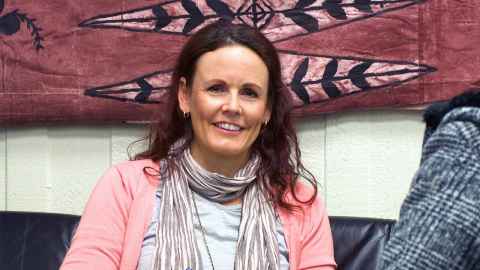Struggling families need money not blame
9 February 2023
Recent child development theories have influenced child protection in Aotearoa in ways that have further stigmatised struggling families, according to a new study from the University of Auckland.

Professional teaching fellow Eileen Joy’s completed PhD thesis on child protection in New Zealand is a strong critique of current child protection policies and practice which are heavily influenced by reforms during the 2010s.
“I chose to focus on that period because there was a lot of policy change and upheaval that became the building blocks for what’s going on now, including the unfortunate Hawkes Bay baby uplift event,” says Joy, who teaches on the social work programme and is also a registered social worker who has worked in child protection.
In the process of speaking to 24 current and former social workers at Oranga Tamariki, (known as CYF prior to 2017) she concluded that child protection social workers are explicitly encouraged to ignore poverty in their work, and yet many said simply giving families more money for the necessities of life would make all the difference.
“The whole family needs to be uplifted so the individual child can be uplifted,” she says.
“Just ordering parents to go to parenting classes won’t do it. It’s incredibly stressful not being able to pay your bills. I would challenge any parent to parent well under that level of pressure.”
Child development policies which inform current practice put an overriding emphasis on the first three years of life, she found.
"They’re basically saying you have to do all this foundational brain development work with your child in the first three years or otherwise they’re stuffed. But the irony is, how are those children, when they become parents, meant to parent better than the way they were parented, if their brain has been so badly and permanently affected?"
The whole family needs to be uplifted so the individual child can be uplifted.
“So it’s circular and also really hopeless. It doesn't allow for the brain’s true plasticity and neuroplasticity; children can and do recover.”
She also found the current system puts unsustainable pressure and blame on poor, young, Māori mothers who are often the focus of child protection services, making it both “racist and classist”.
“Their inability to shelter their child from things like poverty, colonisation, or even something like the recent flooding in Auckland is what determines whether they are a good parent or not, rather than putting the onus on provision of help from state, which would get rid of some of these structural barriers.
“There is also a view that these mothers don’t love their children; of course they do!”
Her thesis critiques another factor influencing policy, the notion of social investment, which arose out of the Third Way, a centrist political position that advocates for a mix of centre-right economic policies and centre-left social policies.
“It’s the kind of direction Tony Blair’s Labour government was known for, among others, and it’s something the current National Party would like to bring back. It’s also been used by the Labour government as a measure of wellbeing.”

Joy says it basically situates individuals as ‘future projects’, not as people who are worthy of help right now simply because they matter and deserve it.
"It’s very much centered around people being economically productive units and working out if they’re going to become a welfare-dependent liability to the taxpayer, who is always seen as different to and separate from the child – or parents – who needs the help."
The reality, she believes, is quite the reverse. “The state has been extremely costly to Māori.”
Her thesis is clear that the blame for unsatisfactory policies and outcomes shouldn’t be heaped on individual social workers, who are often lacking in professional development opportunities beyond their initial qualification due to lack of funding.
“They are often just doing what they’ve been told to do and it’s a very hard job. We have to get beyond blaming individuals when something goes wrong.”
She concludes that the structure of Oranga Tamariki itself needs to fundamentally change at every level.
“The system, and therefore the social workers, needs to recognise and respond to these structural factors, like poverty and colonisation. And this overarching change ultimately rests with the government as part of honouring Te Tiriti.”
It’s a proven fact. You give people enough money to live on and child abuse and neglect statistics go right down. They might not disappear completely, but they would be reduced.
And while Joy is the first to admit these are highly complex problems, until the playing field is more level, ‘throwing money at the problem’, a phrase often used by politicians as a slur, is the right and humane thing to do; in the form of increased benefits, a basic universal income or however it can be done, she says.
“It’s a proven fact. You give people enough money to live on and child abuse and neglect statistics go right down. They might not disappear completely, but they would be reduced.
“The welfare system is essentially punitive, it was never originally designed that way, rather it was to hold people up in dignity while they got their lives sorted. But now it doesn’t even do that with this cost-of-living crisis.
“If we truly care about children, why are we punishing them through their parents?”
Media contact
Julianne Evans | Media adviser
M: 027 562 5868
E: julianne.evans@auckland.ac.nz